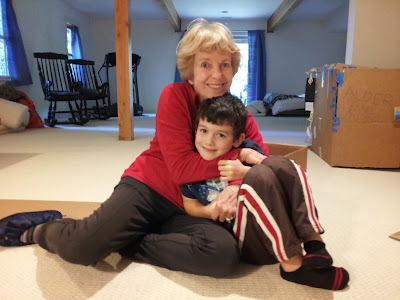Genes, breasts and tests
In July I met with a genetic counselor; it was a hoop I had to
jump through in order to get genetic testing. I figured I had learned what I
needed to know from the pamphlet, “Your Jewish Genes: Hereditary Breast Cancer
and Ovarian Cancer,”[i] which I found in my oncologist’s waiting area.
But no! Bob Resta was a
fast-talking, information-dense fount of facts[ii].
My attorney friend Layla and my physician father happened to be with me, and we
were all fascinated, so I thought I’d share some of what we learned as I decimated Mr. Resta's bowl of Dove chocolate and madly scribbled in my notebook.[iii]
American women as a whole have a 12 percent lifetime risk of
breast cancer. Ninety percent of breast cancer cases do not have an obvious
genetic component. There are six genes known to cause breast cancer, at least
four of which he said I clearly did not have. Some 30 percent of women who have
a breast cancer gene don’t have a family history of breast cancer.
Resta felt it was worth testing me for BRCA1 and BRCA2,
two of the better-known breast cancer genes. The odds of a person on the street
having a cancer-carrying BRCA gene mutation are about one in 1,000. The chances
of an Ashkenazi Jew[iv] having the gene are one
in 40. The chances of an Ashkenazi Jew with breast cancer under age 50, with no
family history –e.g., me – carrying the gene are one in 10. Striking, no doubt,
but it also means there was a 90 percent chance I didn’t have the gene.
One reason to test for BRCA is that it has bearing on treatment
decisions. A BRCA-positive woman with breast cancer has a 40 to 50 percent chance
of developing breast cancer in the other breast, as opposed to a 5 percent
chance without the gene. Presence of a BRCA gene also elevates the risk that a
woman with breast cancer will develop ovarian cancer, from 2 percent without
the gene to 20-40 percent with the gene. Hence many women with the gene opt for
a double mastectomy, oophorectomy and fallopian tube removal, which reduce the
chance of developing new cancers. But frankly, the prognosis is poorer with the gene, though like everyone else I have encountered at Swedish, Resta did not talk about prognosis.
There are also implications for one’s children, who have a
50 percent chance of inheriting the mutation, assuming only one parent has it. While
the risk for one’s daughters is obvious, BRCA2 in particular increases the risk
of male breast and prostate cancer. Children generally aren’t tested before
their mid-20s, and face difficult choices if they have the gene.
Interestingly, Resta said, while most women with the
gene opt for double mastectomy, overall survival is the same for those who don’t.
But the pathway to survival is different for those who leave the second breast,
involving frequent screening and, if and when cancer is detected, aggressive treatment.
Most women at high risk of a second breast cancer don’t want to go through it
again and have their surgeon cut ‘em both off. I’ve met many without the breast
cancer gene who opt for double mastectomy, so traumatized are they by the cancer
diagnosis and treatment, and so alienated from their breasts as anything but
fear-inducing harbors of potential disease.
Resta told me there were three possible results of
genetic testing:
-yes: I have one of the known breast cancer genes;
-no: I don’t have a known breast cancer gene, though it’s
always possible I have one that hasn’t been identified; or
-maybe: I have a rare mutation on the BRCA1 or BRCA 2 gene
but it’s unknown whether the particular mutation is a “good guy,” a “bad guy”
or a benign variant.
I decided to order the Ashkenazi panel, a limited and less
costly test of the genes I’m most likely to have. My insurance said it would
spring for the $600.
I also learned that I could have my DNA banked for $200. This
means my DNA will be stored and can be tested as researchers identify additional
genes. According to Mr. Resta, the 2008 federal GINA (which refers to the Genetic
Information Nondiscrimination Act, not a female body part) says health insurers
can’t use genetic information as a preexisting condition; such protections do
not apply to life insurance or disability insurance. Resta suggested that if I
bank my DNA, I specify in my will who can and cannot access my genetic
information.
I was pretty convinced I didn’t have a breast cancer gene.
My family’s longevity is legendary – my dad’s cousin Bob, whose mother lived to
105, used to threaten to take up chain-smoking at 80. (He turned 80 a few years
ago and instead of smoking, he runs his hobby farm.) My grandmother and her
four sisters, and my mother and her two sisters and their many female cousins
and nieces were and are vivacious, long-lived and almost uncannily cancer-free.
My dad’s family tree was disrupted when he and his parents fled Austria in 1938,
but we’ve stayed in contact with most of the surviving family. There are fewer
females in the lineage, but again zero cancer history.
So I was not surprised when the results of the Ashkenazi
panel and the general panel I subsequently ordered came back negative. For the
sake of my children’s privacy and emotional wellbeing, I would not have written
this post or divulged the results otherwise; it’s enough stress to have your
mother get cancer without growing up knowing you are at increased risk as well.
While my results came as a relief, the process filled me with compassion about the added fears and decisions those with the gene face.
[i]
It’s produced by Sharsheret, a nonprofit organization. Here’s a link: http://www.sharsheret.org/brochure/488
[ii]
No doubt a Jew himself, with the hallmarks of the straight-shooting New York
variety, he opened our interview with, “There are Jews in Alaska?” I was momentarily
taken aback, having forgotten I’d answered yes to, “Are you of Ashkenazi Jewish
descent?” on my intake questionnaire.
[iii]
Layla and I both considered changing careers. That is, until we realized the
market for genetic counseling in Juneau has to be pretty slim.
[iv]
Jews are generally divided into two ethnic groups: Ashkenazim are descended from
Eastern Europe and Russia and comprise 75-85 percent of Jews worldwide. Sephardic
Jews are of Arabic and North African descent.
 |
| Alder ran 18 laps in 20 minutes at last week's jogathon PTO fundraiser. He loved it. The girl behind him is skipping. |
 |
| Alder had a great time with Grandma Mary, especially playing "cardboard city." |
 |
| Elias brought his mom, my dear friend Emily, with him. (It rained all weekend--we're in front of an indoor mural.) |
 |
| My cousin Fran from Las Vegas brought thoughtful gifts and her loving self to the infusion room yesterday. |
 |
| So shoot me, I posted another food photo: halibut (thank you, Kaelke family), mango-avaocado salad, black beans with butternut squash, brown basmati rice. |




Nice blog... It is important to understand how to get tested for breast cancer gene. Here I found valuable information. Thanks for sharing.
ReplyDelete